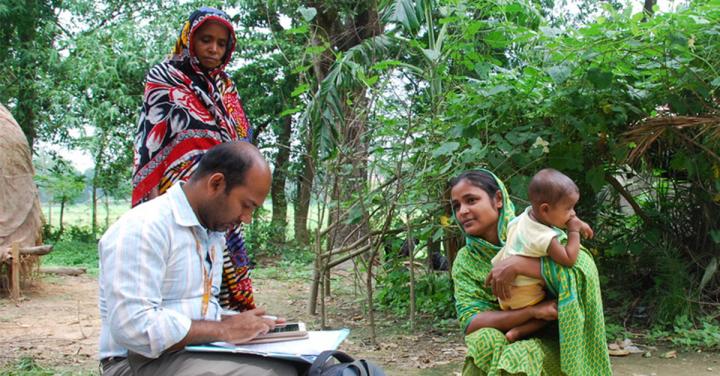
Credit: WEHI, Australia
A Melbourne-led research consortium investigating the impact of iron treatments on maternal and newborn health in low-income countries has received two major grants from the Bill & Melinda Gates Foundation worth almost $US 9.6 million.
The funding, awarded in 2020, will support major clinical trials in Malawi, South Asia, Africa and Bangladesh, investigating whether intravenous iron treatment given to women in pregnancy improves the physical and psychological health of mothers, and the growth and brain development of their babies. The study will also address whether intravenous iron supplements impact mother-baby bonding and breastfeeding rates.
The project is led by WEHI researcher Associate Professor Sant-Rayn Pasricha, who also leads the Collaborating Centre for Anaemia Detection and Control at WEHI and is a haematologist at The Royal Melbourne Hospital. It also involves researchers from the University of Malawi College of Medicine, the International Centre for Diarrhoeal Diseases Research, Bangladesh (icddr,b), the University of Melbourne’s School of Population and Global Health and School of Psychological Sciences, and Doherty Institute, and Monash University’s School of Public Health and Preventive Medicine.
At a glance
- Anaemia is a common problem for pregnant women in low-income countries, causing a range of health problems for both the mother and the baby.
- The US $4.99 million and $4.6 million grants from the Bill & Melinda Gates Foundation will advance clinical trials led by researchers in Melbourne, Malawi and Bangladesh, looking at the impact of intravenous iron infusions on the health of mothers and babies in Malawi.
- The trials comprise the largest programme ever undertaken to investigate whether modern intravenous iron infusions can improve the physical and psychological health of mothers and babies during the first months after birth.
The importance of iron
Worldwide, almost 40 per cent of pregnant women are iron deficient. This can have serious, long-term health implications for both mothers and their babies. Iron deficiency is a particular concern in low-income countries where iron deficiency anaemia is prevalent and many pregnant women find it hard to access iron-rich foods or iron supplements.
Dr Pasricha said iron deficiency in pregnant women has been linked to a range of serious health complications including low birth weight, an increased risk of death from haemorrhage after birth and developmental problems in the baby.
“Tragically, iron deficiency can be cured by iron supplementation, but for many women this is not an option,” he said. “In low-income countries, the only form of iron supplements that is available is in a pill form. However, this ‘oral’ form of iron must be taken regularly by pregnant women, may be poorly tolerated, and requires regular contact with medical centres – which are often not available in low-income countries.
“This means the health of millions of mothers and babies is suffering from anaemia – a situation that is preventable.”
A better way to get iron
The funding from the Bill & Melinda Gates Foundation will enable Dr Pasricha and his collaborators to perform two new randomised controlled trials to look at whether a single-dose intravenous iron treatment in the third trimester of pregnancy can improve the health of mothers and babies at delivery and during the first 12 months after birth.
“We will be following 630 pregnant women in Malawi to compare the impact of intravenous iron treatments in the third trimester of pregnancy with oral iron treatments that are commonly used,” Dr Pasricha said.
“In Bangladesh, we will be enrolling 915 pregnant women to assess the effects of intravenous iron treatments on the health of the mother and baby, again comparing them with oral iron supplements.
“Undertaking these trials in both Asia and Africa will help us find out whether the interventions are useful and safe in two very different low-income settings.
“Our collaborative team brings together a broad range of research expertise, meaning we can consider a range of health factors impacting the mothers and their babies,
“Finally, in Bangladesh, we will undertake a demonstration programme to find out whether it is possible to deliver this more complex treatment in a low-income, rural healthcare setting.”
The study will measure the impact of intravenous iron treatments on various aspects of health, including:
- preventing anaemia in women before and after birth, and reducing serious complications during birth, including death from haemorrhage
- impacting babies’ brain growth and other aspects of development in the first year of life
- reducing psychological problems in mothers
- improving mother-baby bonding and increasing rates of breastfeeding
The funding will also enable researchers to extend a trial previously funded by the Bill & Melinda Gates Foundation, which is looking at the health impacts of intravenous iron given to women in the second trimester of pregnancy, an ongoing study that involves more than 800 women in Malawi. The research team will also investigate the best approaches to deliver intravenous iron therapies to women in remote and resource-poor communities.
Dr Pasricha said this was the world’s most comprehensive study looking at the impacts of intravenous iron on maternal and child health. “We are honoured the Bill & Melinda Gates Foundation has chosen to fund this research. We are confident it will lead to significant improvements in the health of women and children around the world,” he said.
In addition to the funding from the Bill & Melinda Gates Foundation, Associate Professor Pasricha receives support from the Australian Government’s National Health and Medical Research Council (NHMRC) and the Victorian Government.
###
Media Contact
Vanessa Solomon
[email protected]
Original Source
https:/




